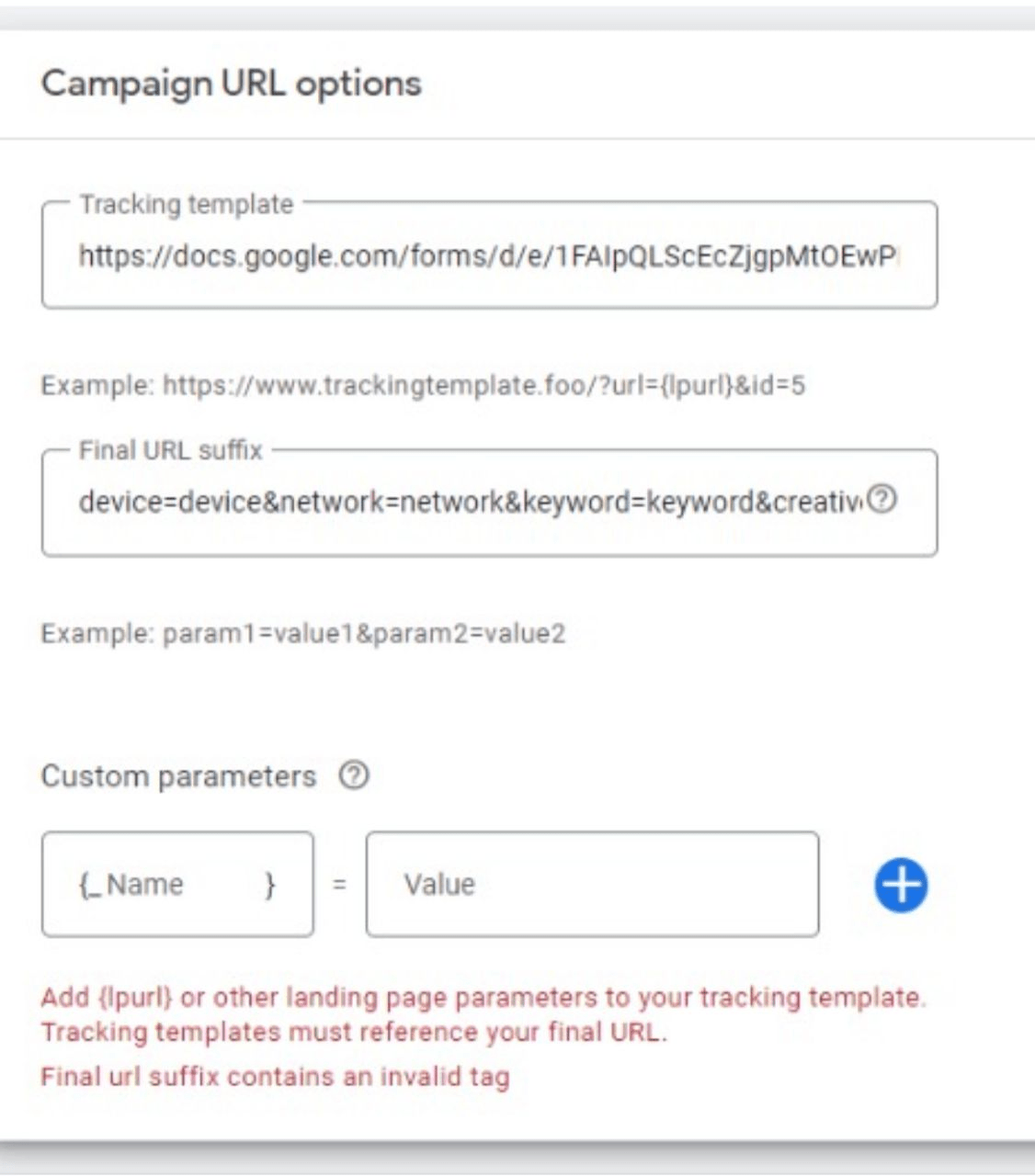Google Ads Tracking Template
Google Ads Tracking Template - If you define multiple tracking templates at different levels, the most specific template is used. You can also use google ads tracking templates for your shopping campaigns to specify additional tracking information. Expand the attributes option and click tracking template. Click the columns icon then choose modify columns. When an ad is clicked, this information will be added to your final url to create your landing page url. Click on the page menu at the level you wish to test your landing page.
If you define multiple tracking templates at different levels, the most specific template is used. For example, you can add custom parameters or valuetrack parameters to your tracking templates. Sign in to your google ads account. If you define multiple tracking templates at different levels, the most specific template is used. Add the “tracking template” column to your table.
A tracking template created at the ad group, campaign, or account level applies to all of the ads in the corresponding ad group, campaign, or account. A tracking template at the ad group, campaign or account level applies to all of the ads in the corresponding ad group, campaign or account. Click the columns icon then choose modify columns. Tracking.
You can also use google ads tracking templates for your shopping campaigns to specify additional tracking information. In your google ads account, click the campaigns icon. Click the column icon above the statistics table, then click modify columns. A tracking template at the ad group, campaign, or account level applies to all of the ads in the corresponding ad group,.
Tips for setting up your tracking template. The keyword tracking template is the most specific followed. If you define multiple tracking templates at different levels, the most specific template is used. A tracking template at the ad group, campaign, or account level applies to all of the ads in the corresponding ad group, campaign, or account. There are two types.
If you define multiple tracking templates at different levels, the most specific template is used. A tracking template created at the ad group, campaign, or account level applies to all of the ads in the corresponding ad group, campaign, or account. The keyword tracking template is the most specific followed. A tracking template at the ad group, campaign, or account.
Sign in to your google ads account. If you define multiple tracking templates at different levels, the most specific template is used. When an ad is clicked, this information will be added to your final url to create your landing page url. The keyword tracking template is the most specific followed by the ad, ad group, campaign, then account. Click.
Google Ads Tracking Template - Click the columns icon then choose modify columns. There are two types of tracking parameters: For example, you can add custom parameters or valuetrack parameters to your tracking templates. When an ad is clicked, this information will be added to your final url to create your landing page url. Expand the attributes option and click tracking template. Tracking parameters pass information about the click for your account, campaign, or ad group in the tracking template.
Enter parameters in the “final url suffix” field. We recommend that you use the {unescapedlpurl} valuetrack parameter in your tracking template. Tracking parameters pass information about the click for your account, campaign, or ad group in the tracking template. For example, you can add custom parameters or valuetrack parameters to your tracking templates. Click the column icon above the statistics table, then click modify columns.
A Tracking Template At The Ad Group, Campaign, Or Account Level Applies To All Of The Ads In The Corresponding Ad Group, Campaign, Or Account.
A tracking template at the ad group, campaign, or account level applies to all of the ads in the corresponding ad group, campaign, or account. Tips for setting up your tracking template. When an ad is clicked, this information will be added to your final url to create your landing page url. Expand the attributes option and check “tracking template.” click apply.
Click On The Page Menu At The Level You Wish To Test Your Landing Page.
Sign in to your google ads account. Before you begin, you may have to add the “tracking template” column to your table: Add the “tracking template” column to your table. You can also use google ads tracking templates for your shopping campaigns to specify additional tracking information.
We Recommend That You Use The {Unescapedlpurl} Valuetrack Parameter In Your Tracking Template.
Expand the attributes option and click tracking template. Click the columns icon then choose modify columns. The keyword tracking template is the most specific, followed by the ad, ad group, campaign, then account. Click the campaigns drop down in the section menu.
“Tracking Template:” The Field Where You Will Put Tracking Information.
If you define multiple tracking templates at different levels, the most specific template is used. The keyword tracking template is the most specific followed by the ad, ad group, campaign, then account. Enter parameters in the “final url suffix” field. Click on the ad groupspage under the campaigns drop down, or the dynamic ad targets, or keywords tab under the audiences, keywords, and content drop down.


